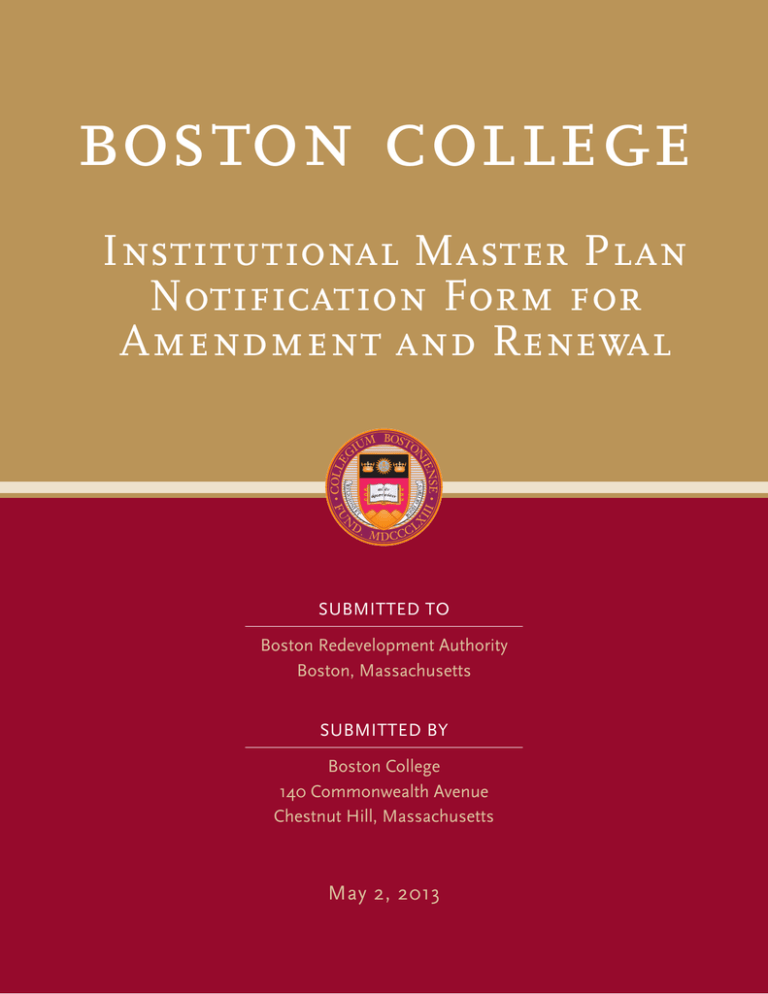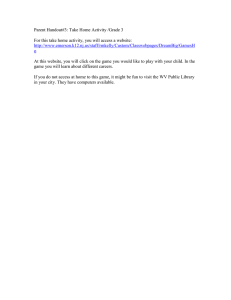boston college Institutional Master Plan Notification Form for Amendment and Renewal
advertisement

boston college Institutional Master Plan Notification Form for Amendment and Renewal SUBMITTED TO Boston Redevelopment Authority Boston, Massachusetts SUBMITTED BY Boston College 140 Commonwealth Avenue Chestnut Hill, Massachusetts May 2, 2013 Boston College IMPNF Table of Contents BOSTON COLLEGE INSTITUTIONAL MASTER PLAN AMENDMENT AND RENEWAL .................... 1-1 1.1 Introduction .................................................................................................................................................. 1-1 1.2 Boston College Mission and Objectives ................................................................................................ 1-1 1.2.1 Major Programs and Initiatives........................................................................................................ 1-2 1.3 Status of IMP Projects and Need for an IMP Amendment ................................................................ 1-3 1.4 Existing IMP Proposed Institutional Project .......................................................................................... 1-4 1.5 Amended IMP Proposed Institutional Project ...................................................................................... 1-4 1.6 IMP Renewal ................................................................................................................................................. 1-5 1.7 Waiver of Unchanged Plans ...................................................................................................................... 1-5 Table of Contents Boston College IMPNF BOSTON COLLEGE INSTITUTIONAL MASTER PLAN AMENDMENT AND RENEWAL 1.1 Introduction In the spring of 2003, Boston College ("the University") embarked on a comprehensive strategic planning initiative to define the University’s needs and establish institutional goals for the coming decade and beyond. After several years of planning, a Strategic Plan was adopted by the Board of Trustees in February 2006. After working almost two years with the surrounding neighborhood, Boston College submitted an Institutional Master Plan Notification Form ("IMPNF") outlining the institutional needs of the University in December 2007. Based on the Scoping Determination on the IMPNF issued by the Boston Redevelopment Authority ("BRA"), Boston College submitted an Institutional Master Plan ("IMP") in June 2008. In subsequent IMP filings with the BRA and the Boston Zoning Commission in January and March of 2009 respectively, Boston College changed the IMP in response to community concerns. The IMP was ultimately approved by the Boston Zoning Commission on June 10, 2009. The purpose of this document is to amend the existing IMP to reflect de minimus dimensional changes in the 2150 Commonwealth Avenue project ("Proposed Institutional Project") and to renew the IMP pursuant to the requirements of Article 51, Allston-Brighton Neighborhood District zoning, of the Boston Zoning Code ("Code"). The proposed de minimus dimensional changes to the 2150 Commonwealth Avenue project described below meets the requirements for a waiver of further review of unchanged plans pursuant to Section 80D-5.2(e) of the Code. The renewal of the IMP, which is required every four years by Article 51, Allston-Brighton Neighborhood District zoning, does not add any new projects or any new land to the IMP, does not change any Proposed Institutional Project previously approved in the IMP other than for de minimus dimensional changes and does not result in any significantly greater impacts than previously projected in the IMP. Accordingly, the IMP renewal also meets the requirements for a waiver of further review of unchanged plans pursuant to Section 80D-5.2(e ) of the Code. 1.2 Boston College Mission and Objectives Strengthened by more than a century and a quarter of dedication to academic excellence, Boston College commits itself to the highest standards of teaching and research in undergraduate, graduate, and professional programs and to the pursuit of a just society through its own accomplishments, the work of its faculty and staff, and the achievements of its graduates. It seeks both to advance its place among the nation's finest universities and to bring to the company of its distinguished peers and to contemporary society the richness of the Catholic intellectual ideal of a mutually illuminating relationship between religious faith and free intellectual inquiry. Boston College draws inspiration for its academic societal mission from its distinctive religious tradition. As a Catholic and Jesuit university, it is rooted in a world view that encounters God in all creation and through all human activity, especially in the search for truth in every discipline, in Institutional Master Plan Amendment and Renewal 1-1 Boston College IMPNF the desire to learn, and in the call to live justly together. In this spirit, the University regards the contribution of different religious traditions and value systems as essential to the fullness of its intellectual life and to the continuous development of its distinctive educational heritage. Boston College pursues this distinctive mission by serving society in three ways: 1. By fostering the rigorous intellectual development and the religious, ethical, and personal formation of its undergraduate, graduate, and professional students in order to prepare them for citizenship, service, and leadership in a global society 2. By producing nationally and internationally significant research that advances insight and understanding, thereby both enriching culture and addressing important societal needs 3. By committing itself to advance the dialogue between religious belief and other formative elements of culture through the intellectual inquiry, teaching, learning, and community life that form the heart of the University. Boston College fulfills this mission with a deep concern for all members of its community, with recognition of the important contribution that a diverse student body, faculty, and staff can offer, with a firm commitment to academic freedom, and with a determination to exercise careful stewardship of its resources in pursuit of its academic goals. 1.2.1 MAJOR PROGRAMS AND INITIATIVES The Strategic Plan Each decade since 1975, Boston College has engaged in a comprehensive, long-range strategic planning process to guide its institutional vision. In February 2006, the Board of Trustees approved a Strategic Plan titled “Excellence, Distinction, Leadership: Boston College in the 21st Century,” which was the result of a two-year assessment and planning process that involved more than 200 faculty, students, and staff. The Strategic Plan calls for hiring up to 100 new faculty and adding several new academic centers and institutes as part of a 10-year $1.6 billion investment in the University’s future. The Strategic Plan developed seven strategic directions, each stemming from an existing strength and flowing directly from the University’s mission, that distinguish Boston College from its peers in critical areas. These seven strategic directions include: 1. Commit Boston College to becoming the leader in liberal arts education among American universities. 2. Develop and implement a student formation program that will be a contemporary model for colleges and universities committed to student formation. 3. Identify and support selected research commitments that will achieve excellence and distinction in addressing urgent societal problems. 4. Commit targeted resources to selected natural sciences emphases that will establish Boston College as a national leader in these areas. Institutional Master Plan Amendment and Renewal 1-2 Boston College IMPNF 5. Build on the strengths and reputations of Boston College’s professional schools to establish leadership in critical professional areas. 6. Become a significant intellectual and cultural crossroads by leveraging Boston College’s international resources and partnerships, and its Jesuit and Catholic networks. 7. Become the world’s leading Catholic university and theological center. The Campus Master Plan Upon the completion of the Strategic Plan, Boston College hired the nationally respected campus architecture and planning firm Sasaki Associates of Watertown to help develop a long-range Campus Master Plan that would provide Boston College with an opportunity to achieve excellence by using the strength and distinctiveness of its campus to reinforce its mission and strategic objectives. The Campus Master Plan was designed to meet several goals for the campus based on the following guiding principles. Create One Campus—That the former Archdiocesan property become fully integrated with the Boston College campus, and that the 120-acre Chestnut Hill Campus, the 40-acre Newton Campus, and the 65-acre Brighton Campus each provide a notable setting that contributes to the campus learning environment and the life of the University. Develop Mixed Campus Uses—That Boston College’s campuses host a mix of academic, residential, and co-curricular facilities, and provide civic, spiritual, and open space areas that foster a vibrant and engaged University community. Emulate the Character of the Middle Campus—That the new facilities on the Lower and Brighton campuses reflect the distinctive character of the Middle Campus with its combination of Gothic architecture and collegiate open spaces, linked quadrangles, and walkways. Provide Appropriate Campus Density—That campus development emulate the Middle Campus’ proportion of open space to building space, reflecting the Middle Campus height (4-5 stories) and open-space pattern, while respecting the character of the surrounding community. Promote Student Formation—That the Lower and Brighton campuses develop undergraduate student housing reflecting the University’s commitment to student formation that supports intellectual development and responsible student behavior in smaller living communities. Achieve Sustainability—That development on each campus achieve higher levels of energy efficiency and champion the natural environment, and that sustainability goals be carefully considered with each project. 1.3 Status of IMP Projects and Need for an IMP Amendment The Boston College IMP that was approved in 2009 lists a total of 17 Proposed Institutional Projects in the City of Boston that the University plans to construct over a decade's time (see Table 5-2 of the IMP). Since the approval of the IMP, the University has constructed two of the projects. The University converted the 90,000 square foot Bishop Peterson Hall at 129 Lake Institutional Master Plan Amendment and Renewal 1-3 Boston College IMPNF Street into administrative offices for the University finances and human resources departments. The project was completed in October 2011 at a cost of $20.4 million. The University also renovated and expanded 2121 Commonwealth Avenue (formerly known as the Chancery) for office space for the University Advancement program. This project was completed in February 2012 at a cost of $21.1 million. These two projects were necessary precursors for the proposed 2150 Commonwealth Avenue project as they allowed for the relocation of staff out of the existing administrative building on the project Site. The Proposed Institutional Project at 2150 Commonwealth Avenue is described as a “Proposed Institutional Project” in the approved Boston College IMP and only de minimus dimensional changes are being made from the project as described in the approved IMP. The current design of the Proposed Institutional Project has evolved since the preparation of the IMP in 2009 and is not completely consistent with proposed height as described in the IMP. Therefore, an IMP amendment and waiver of further review of unchanged plans is being sought by the University as part of the Article 80 review process as described below. 1.4 Existing IMP Proposed Institutional Project The Proposed Institutional Project at 2150 Commonwealth Avenue as described in the approved IMP includes two adjacent buildings that are four to six stories high with a maximum height of 60 feet. The primary use is for undergraduate student housing with 470 beds, parking for up to 100 vehicles, and a principal sub use of student lounges. The Proposed Institutional Project includes the following areas: 235,000 gross square feet ("gsf") for housing, 12,000 gsf for retail, and up to 35,000 gsf for parking (a total of 282,000 gsf). The existing 64,584 gsf building would be demolished. 1.5 Amended IMP Proposed Institutional Project The Proposed Institutional Project, as currently proposed for the IMP Amendment, will be slightly higher than originally contemplated in the IMP. The proposed building height is five to six stories with a maximum height of 79.5 feet. This is considered a de minimus dimensional change as the actual building height in stories is essentially the same and the occupied height of the building is the same, but the measuring point of the surrounding grade has been recalculated to reflect the 16 foot grade differential across the site. The principal use of the building will remain the same as undergraduate housing, with245,000 gsf of building with a capacity of 484 student beds. University Health Services will be located on the ground floor and occupy approximately 11,000 gsf of the building. There will be parking for approximately 22 vehicles. The building will be a maximum of 79.5 feet in height (per zoning ordinance definition). (See Table 7-1, Existing and Proposed Changes to the IMP.) The existing 64,584 gsf building would be demolished. Accordingly, the IMP Amendment meets the requirements for a waiver of review of unchanged plan pursuant to Section 80D-5-2(e) of the Code. Institutional Master Plan Amendment and Renewal 1-4 Boston College IMPNF Table 7-1, Existing and Proposed Changes to the IMP Condition Gross Square Feet Stories Height (feet) Use Number of Beds Parking Spaces 1.6 Existing IMP 1 Total – 282,000 Housing – 235,000 Retail – 12,000 Parking - <= 35,000 4-6 60 Undergraduate Housing, Retail, Parking 470 0-100 Proposed IMP 2 Total – 245,000 Housing – 234,000 Health Services – 11,000 5-6 79.5 Undergraduate Housing, Health Services, Parking 484 22 IMP Renewal The Boston College Institutional Master Plan was approved for a 10-year term by the Boston Zoning Commission on June 10, 2009. In accordance with Section 80D-8(1) of the Code, Time for Renewal of Institutional Master Plan, an IMPNF for renewal shall be filed on or before the time specified in the underlying zoning or in the IMP. In this case, the underlying zoning requires a renewal earlier than the 10-year term of the IMP. The underlying Allston-Brighton Neighborhood District zoning (Article 51 of the Code) in Section 51-29(6) of the Code requires that an Institutional Master Plan Notification Form ("IMPNF") for renewal shall be filed on or before the fourth anniversary of the original IMP, or the most recent renewal thereof. That fourth year anniversary date is June 10, 2013. Accordingly, as part of this IMPNF, a renewal of the IMP for a four-year period until June 10, 2017 is being requested. 1.7 Waiver of Unchanged Plans Pursuant to Section 80D-5(2)(e), this IMPNF for Amendment and Renewal meets the requirements for a Waiver of Further Review of Unchanged Plans as:(1) no new Proposed Institutional Projects are planned; (2) no changes in the IMP are proposed, other than de minimus dimensional changes to the 2150 Commonwealth Avenue project; and (3) there are no significantly greater impacts from the continued implementation of the IMP as amended and renewed than were originally projected. The University hereby requests the Boston Redevelopment Authority to waive the requirement of a Scoping Determination for the Amendment and Renewal pursuant to paragraph (e) of Section 80D-5.2 of the Code, Waiver of Further Review of Unchanged Plans, and approve this IMPNF for Amendment and Renewal and the approved IMP together as the renewed and amended IMP. 1 2 Existing IMP gsf includes mechanical space and parking. Proposed IMP gsf excludes mechanical and rooftop space per zoning definition. Institutional Master Plan Amendment and Renewal 1-5



